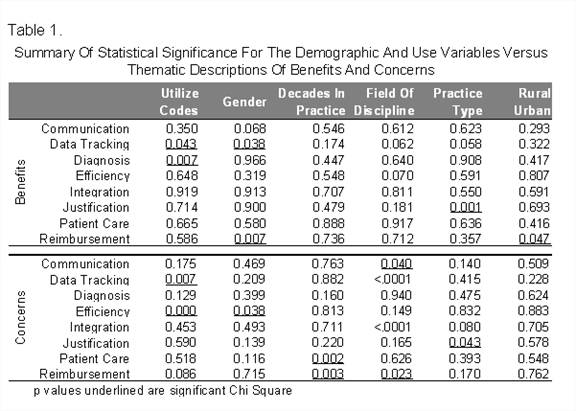Objectives: With the exception of some dental specialists, most U.S. dentists do not commonly use diagnostic codes for reimbursement of services, but rather utilize procedure codes. With a national electronic health record system developing, diagnostic codes may one day be part of everyday dental practice. This study investigates dentists' current attitudes regarding the use of diagnostic codes in dentistry, and if such codes should be taught in dental schools.
Methods: Respondents were asked questions regarding their understanding and opinion of diagnostic codes, asked to comment about potential benefits and concerns, and asked for biographical and demographic information in an e-mail survey to an estimated 3600 dentists; N=574 responded. Respondents' opinions were thematically coded. Analysis was accomplished using repeated-measures logistic regression.
Results: Respondents reported (97) 17% female, 468 (93%) urban practice, 420 (74%) general dentists, and 205 (52%) solo private practice. The most common benefit cited regarding dental diagnostic codes was diagnosis (28%); the least common benefit was integration (1%). 15% more concerns were cited than benefits, with the most common concern being efficiency (40%); the least common concern was integration (1%). Summary of statistically significant p values from analysis for the demographic and use variables versus thematic descriptions of benefits and concerns appears in Table 1. 427 (75%) agreed or strongly agreed that diagnostic codes should be taught in dental school, and when collapsed into either agreed, neutral, or disagreed, no significant relationship was found with any demographic variables (ChiSq>0.05).
Conclusions: Dentists cite more concerns than benefits regarding diagnostic codes. Dentists' decade in practice and field of discipline were not significant for benefits, nor was rural/urban practice for concerns. Dentists' gender, practice type and utilization of codes were significant for both benefits and concerns. Most dentists think diagnostic codes should be taught in dental school.
Keywords: Health services research and diagnostic codes
![[ Visit AADR's Website ]](images/banner.jpg)
